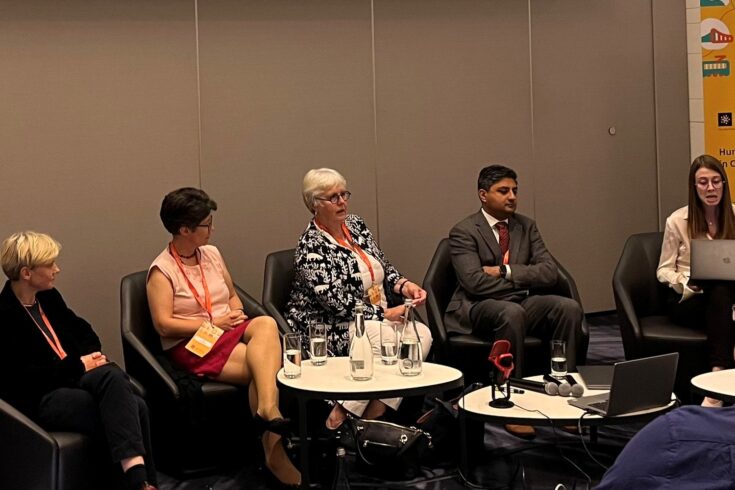AHRC has been unanimously elected as chair of the HERA network.
This notable coalition of 24 national funding agencies is dedicated to leading and developing funding opportunities for humanities researchers across Europe.
This milestone underscores the importance of collaboration and innovation in the humanities, and I am honoured to have been elected to this position in my capacity as Director of Research at AHRC.
Fostering collaboration and innovation
It reflects the collective strength and vision of the AHRC team in fostering collaboration and innovation.
Above all, I view this as an important platform on which to build a clear and bold voice to advocate for the humanities during these transformative times and in the lead up to the European Commission’s next Priority Framework Programme.
Since taking on the chair role (and interim chair over the past year) my focus has been on strengthening partnerships within the network and expanding the reach of the HERA network.
We have held meetings with over 20 member countries to deepen relationships and gather insights on the future of HERA.
Shared priorities
These discussions have revealed shared priorities around fostering interdisciplinary research, expanding inclusivity within the network, and exploring new funding opportunities to address global challenges.
They have also highlighted the need for stronger connections with emerging research communities to ensure HERA remains dynamic and forward-thinking.
These conversations have not only helped shaped the network’s priorities and strategies but have also paved the way for expanding HERA’s reach.
As a testament to the network’s strength and vision, we have extended our network to include as observer members:
- Canada’s Social Sciences and Humanities Research Council
- the National Research Foundation of Ukraine
- Greece’s General Secretariat for Research and Innovation
This is an exciting step forward, and we look forward to welcoming them into our discussion and perhaps as full members in the near future.
Supporting knowledge exchange
The appointment of the HERA Knowledge Exchange Fellow (KEF) is a significant milestone for collaboration across the network.
Jenny Wüstenberg, Professor of History and Memory Studies at Nottingham Trent University and chair of the COST Action on Slow Memory, has been selected following a competitive assessment process involving six applications from three countries.
Knowledge Exchange for Slow Hope
As HERA KEF, she will lead a three-and-a-half-year knowledge exchange programme titled Knowledge Exchange for Slow Hope.
Drawing on past research this initiative centres on the tenet that stories of hope are indispensable to any crisis response.
It aims to bring together researchers, HERA funders, and external stakeholders across Europe to enhance collaboration and build capacity.
The programme’s three main objectives are:
- facilitating knowledge exchange: enhancing the impact of research and advocating for the vital role of humanities in addressing societal challenges
- building skills and capacity: equipping projects with the skills needed to respond effectively to both anticipated and unforeseen crises
- establishing sustainable networks: creating partnerships that will outlive the initial funding period and attract additional resources
The programme will begin with its kick-off conference in late 2025.
This event will bring together researchers, funders, and stakeholders to strengthen collaboration and inspire innovation.
The conference will focus on establishing shared goals for addressing crises, showcasing best practices in interdisciplinary research, and building a roadmap for sustainable partnerships that extend beyond the initial funding period.
HERA research grants: leading in crisis scholarship
The successful launch of the Crisis – Perspectives of the Humanities Research Grants programme marks another significant achievement.
This funding initiative received over 200 outline proposals, with 36 full proposals assessed, resulting in the funding of 10 exceptional projects.
These projects involve 46 research teams from 19 countries, with seven of the 10 projects including participation from widening countries, reflecting HERA’s commitment to inclusivity.
Key highlights include:
- collaborative excellence: AHRC is proud to support seven of the 10 funded projects, the highest number of any HERA funding partner. These projects demonstrate the power of international collaboration, with partnerships spanning Austria, Croatia, Czechia, Denmark, Estonia, Finland, France, Ireland, Norway, Portugal, Romania, Slovenia, Spain, and the UK
- diverse disciplines: the funded projects showcase the breadth of humanities research, encompassing anthropology, history, archaeology, philosophy, cultural studies, arts, linguistics, and media and communication
- impactful research: these projects exemplify how humanities research not only leads in its own right but also convenes cutting-edge interdisciplinary scholarship on crises. For instance, one project examines the norms in language-based human-artificial intelligence interaction, another explores religious responses to (geo)political crises, and a third studies coastlines as zones of ecocultural crisis, shaping resilience through transnational performance-based arts
Looking ahead
In the UK, we need to think strategically to ensure we have a national capability for arts and humanities which contributes to and underpins the broader science agenda.
And this requires sustaining a broad ecosystem of curiosity driven open call funding, alongside a strategic focus on the most pressing issues of our time.
In my role as chair of the HERA network, I remain committed to fostering collaboration, – which remains key for both curiosity driven and strategic research – across Europe and beyond.
With a growing network, innovative research-led programmes built on creativity and insight, and impactful knowledge exchange initiatives, HERA continues as an important collaborative and inclusive network.
Together with our partners across Europe, we have an extraordinary opportunity to shape a transformative future for humanities research.




